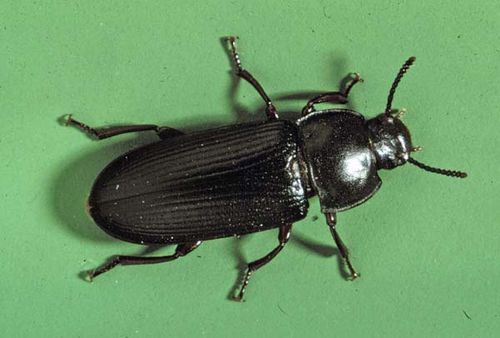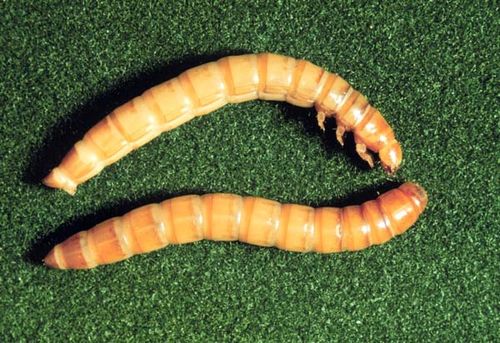|

Yellow Mealworm Beetle
Image by USDA-ARS-GMPRC Image Database - License: Public Domain. (view image details)
|

Yellow Mealworm
Image by USDA-ARS-GMPRC Image Database - License: Public Domain. (view image details)
|
|
|
YELLOW MEALWORM FACTS |
Identification
Yellow Mealworm Beetles are one of the largest insect pests that infest stored food products. The adult beetles are sturdy black elongated beetles with parallel sides. The antennae are slightly longer than the width of the head, and thicken gradually towards tips without clubbed ends. The larvae start off white and darken as they mature becoming brownish yellow and then brown. The mealworm larvae are smooth and shiny with a hard cylindrical body about 3mm in diameter and about 25mm long. The pupae are white at turning yellow and then brown as they mature.
Other Names
Flour Beetle
Size
length: adult beetle to 18mm, larvae to 25mm
Habitat
Yellow Mealworms are often found where grain is stored in feed mills and processing plants, especially around spilled and decaying grain. They prefer undisturbed places such as under sacks, in storage bins and in dark corners and damp areas, and also litter from chicken houses.
Food
It is a minor pest of cereals and cereal products, feeding on flour, cereals, bran, pasta.
Breeding
The female beetle lays white bean shaped eggs in soft ground. The eggs are about 1.25mm and hatch into mealworms (grub like larvae) after about a week. The larvae feed on plant or animal material before pupating. The adult beetle emerges from the pupa after about three to thirty days depending on temperature.
Notes
Yellow mealworm larvae are bred to be used as fish bait and as food for aquarium fish and animals.
Classification
| Class: | Insecta | | Order: | Coleoptera | | Family: | Tenebrionidae | | Genus: | Tenebrio | | Species: | molitor | | Common Name: | Yellow Mealworm |
Relatives in same Genus
Dark Mealworm (T. obscurus)
|
|

